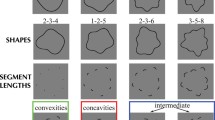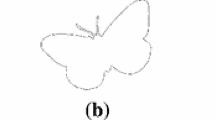Abstract
Inspired by psychophysical studies of the human cognitive abilities we propose a novel aspect and a method for performance evaluation of contour based shape recognition algorithms regarding their robustness to incompleteness of contours. We use complete contour representations of objects as a reference (training) set. Incomplete contour representations of the same objects are used as a test set. The performance of an algorithm is reported using the recognition rate as a function of the percentage of contour retained. We call this evaluation procedure the ICR test. We consider three types of contour incompleteness, viz. segment-wise contour deletion, occlusion and random pixel depletion. We illustrate the test procedure using two shape recognition algorithms. These algorithms use a shape context and a distance multiset as local shape descriptors. Both algorithms qualitatively mimic human visual perception in the sense that the recognition performance monotonously increases with the degree of completeness and that they perform best in the case of random depletion and worst in the case of occluded contours. The distance multiset method performs better than the shape context method in this evaluation framework.
Preview
Unable to display preview. Download preview PDF.
Similar content being viewed by others
References
Belongie, S., Malik, J., Puzicha, J.: Shape matching and object recognition using shape contexts. IEEE Transaction on Pattern Analysis and Machine Intelligence 24(24), 509–522 (2002)
Brady, M.: Criteria for representations of shape. In: Beck, J., Hope, B., Rosenfeld, A. (eds.) Human and Machine Vision, pp. 39–84. Academic Press, London (1983)
Chihman, V., Bondarko, V., Shelpin, Y., Danilova, M.: Fragmental figure perception. Perception 33(supplement), 76a (2004)
Foreman, N.P., Hemmings, R.: The Gollin incomplete figures test: A flexible, computerised version. Perception 16, 543–548 (1987)
Ghosh, A., Petkov, N.: Robustness of shape descriptors to incomplete contour representations. IEEE Transactions on Pattern Analysis and Machine Intelligence (2005) (in press)
Gollin, E.S.: Developmental studies of visual recognition of incomplete objects. Perceptual and Motor Skills 11, 289–298 (1960)
Grigorescu, C., Petkov, N.: Distance sets for shape filters and shape recognition. IEEE Transactions on Image Processing 12(10), 1274–1286 (2003)
Grigorescu, C., Petkov, N., Westenberg, M.: Contour detection based on nonclassical receptive field inhibition. IEEE Transactions on Image Processing 12, 729–739 (2003)
Grigorescu, C., Petkov, N., Westenberg, M.A.: Contour and boundary detection improved by surround suppression of texture edges. Image Vision and Computing 22, 609–622 (2004)
Latecki, L.J., Lakämper, R., Eckhardt, U.: Shape descriptors for non-rigid shapes with single closed contour. In: Proc. of IEEE Conf. on Computer Vision and Pattern Recognition, pp. 424–429 (1998)
Marr, D., Nishihara, H.K.: Representation and recognition of the spatial organization of three dimensional shapes. Proc. Roy. Soc. London, B. 200, 269–294 (1978)
Mokhtarian, F., Mackworth, A.K.: A theory of multiscale, curvature-based shape representation for planar curves. IEEE Transactions on Pattern Analysis and Machine Intelligence 14(8), 789–805 (1992)
Petkov, N.: Algorithm for the cost of an optimal assignment of two sets of real numbers. Technical report, 2003-9-07, Institute of Mathematics and Computing Science, University of Groningen (2003)
Shelepin, Y., Vahromeeva, O., Harauzov, A., Pronin, S., Foreman, N., Chihman, V.: Recognition of incomplete contour and half-tone figures. Perception 33(supplement), 85c (2004)
Author information
Authors and Affiliations
Editor information
Editors and Affiliations
Rights and permissions
Copyright information
© 2005 Springer-Verlag Berlin Heidelberg
About this paper
Cite this paper
Ghosh, A., Petkov, N. (2005). Incomplete Contour Representations and Shape Descriptors: ICR Test Studies. In: De Gregorio, M., Di Maio, V., Frucci, M., Musio, C. (eds) Brain, Vision, and Artificial Intelligence. BVAI 2005. Lecture Notes in Computer Science, vol 3704. Springer, Berlin, Heidelberg. https://doi.org/10.1007/11565123_40
Download citation
DOI: https://doi.org/10.1007/11565123_40
Publisher Name: Springer, Berlin, Heidelberg
Print ISBN: 978-3-540-29282-1
Online ISBN: 978-3-540-32029-6
eBook Packages: Computer ScienceComputer Science (R0)




